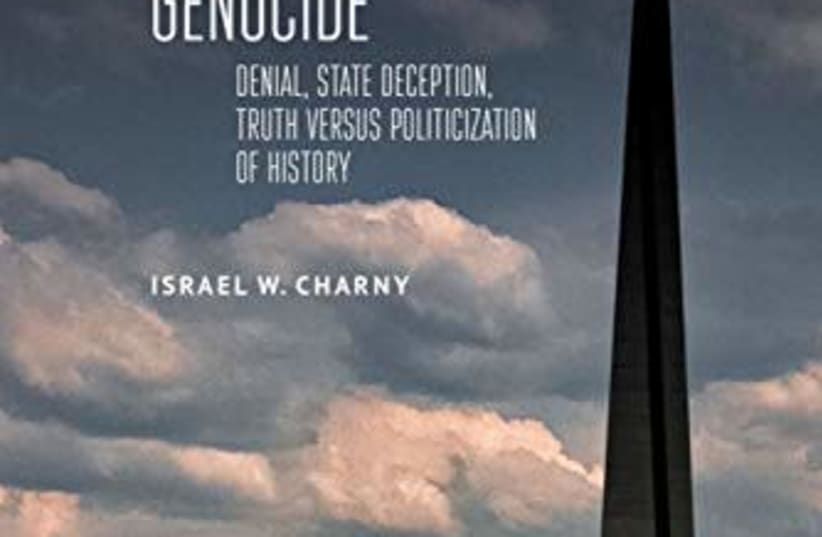The scandal made international headlines and newspapers falsely proclaimed that it had been canceled.
It was not. Charny, one of the founders of the modern study of genocide and a strong fighter for the Armenians against the denial of their genocide by the Turks, does many things in this relatively short book: first his uncovering of the Turkish, Israeli and possibly even American pressure to cancel the conference; then a denouncing of Israel’s cover-up of possibly genocidal actions against women and children at Deir Yassin and several other places some of which were entirely new to me; and a denunciation of Israel’s support of nations and leaders who have committed genocidal acts.
Charny’s book is like a summoning up of old wounds and hurts and their final release because at this stage in life – he is now 90 years old – he has nothing to lose. He was promised support by Yad Vashem, Tel Aviv University, government leaders such as Shimon Peres, academics such as Yehuda Bauer and Alan Dershowitz, and icons like Elie Wiesel. All was going well when word leaked out that several Armenian scholars would be attending and suddenly all funding and support ended, some reluctantly.
Wiesel several times pleaded with Charny to postpone the conference or hold it elsewhere; when Charny refused, Wiesel not only canceled his personal support but prevailed upon Holocaust survivor groups to cancel $10,000 to fund the conference.
This hurt Charny deeply, not just the money but his personal friendship with Wiesel. Charny tries hard not to be bitter and softens his criticism of Wiesel, but the bitterness shines through.
What was Wiesel’s reason for dropping out? True, the Turkish government said this would harm Israeli-Turkish relations but there was another reason: Turkey announced that their small Jewish community would be in danger if Israel did not cancel the conference.
But as newly declassified Israeli documents show, this was a lie: the Jewish community was never in any danger. This was simply a ruse by the Turks. And it worked. Yad Vashem dropped out; Tel Aviv fired Charny and never granted him tenure; Yehuda Bauer wrote a deeply moving private letter condemning the pressure but did not make it public.
Alan Dershowitz, the great liberal fighter of free speech, also bowed out; and Shimon Peres sadly did not show the courage of a future Nobel Peace Prize winner.
What were these documents? They speak for themselves. Charny has held on to these letters and documents for decades waiting patiently for just the right moment to publish them. Perhaps after Elie Wiesel’s death? In any case, here are some examples:
The book concludes with three unique perspectives: Turkish, Armenian and Jewish – Ragip Zarakolu, intrepid publisher in exile in Sweden after being in multiple Turkish jails, wherein his wife also died; Richard Hovannisian, the doyen of Armenian scholarship and an American professor at UCLA; and Michael Berenbaum, former research director of the US Holocaust Memorial Museum in Washington and today a consultant in the building of Holocaust museums internationally.
Each brings a unique perspective to this complex issue; yet in some ways, it is not complex at all.I have called Turkey an “immature nation” in the media (The Boston Globe) in the past since only a “mature” nation like Germany would recognize its genocide; and as long as Turkey does not, it will remain a country with low self-esteem, feeling as it does that they suffered as much as the Armenians; that they were under attack by Armenian radicals; that they in fact, were the victims and not the perpetrators.
When the day comes that they will recognize this genocide, they will be welcomed into the arms of mature nation-states.
A second lesson is that a country like Israel believes in realpolitik, that is, a nation-state acts differently than a human being or a group of people. Israelis as a people are sensitive to this genocide and wish the nation-state to politically acclaim it a genocide; but the nation-state acts as a political unit and makes policy that it feels protects the state, despite what its peoples think. Thus, there is this terrible disconnect between the Israeli people and Israeli leaders.
This brilliant book by a scholar and activist in the prime of his life tells a tale full of flame and fury but with a wisdom accumulated over nearly a century of living the ethics that he upholds – Charny is indefatigable, relentless and humanitarian.
The writer is research associate at the Davis Center for Russian and Eurasian Studies at Harvard University; former vice-president of the IAGS and author of ‘Genocide and Human Rights, The Genocidal Mind, Predicting Genocide and Terrorism Mathematically’ (with Trevor Jones) and the forthcoming ‘Jewish Partisans of the Soviet Union During WWII’ (in both a Russian and English version). In 2016 he was nominated for a Nobel Peace Prize for his work on genocide prediction and prevention
Israel’s Failed Response to the Armenian Genocide, Israel W. Charny, Academic Studies Press, 2021, 288 pages; $26.95
